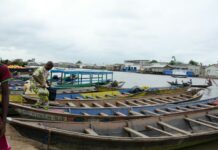Photo credit: DiasporaEngager (www.DiasporaEngager.com).
Coffee farmers in Liberia have high hopes as the International Trade Center (ITC) pushes to strengthen the country’s coffee value chain.
By Judoemue M. Kollie
Monrovia, Liberia, April 16, 2024—The West African Regional Coffee Coordinator for the European Union-funded African Caribbean Pacific countries (ACP) Business Friendly Coffee Project, Mr. Lawrence Attipoe, has informed stakeholders that plans are underway by the International Trade Center (ITC) with support from the European Union to strengthen Liberia’s coffee value chain.
The coffee project implemented in Bong, Nimba, Lofa, Montserrado, and Bomi counties ends in December this year, but there’s a report for a four-year extension.
The goal is to resuscitate the coffee sector of the country.
Speaking to journalists over the weekend in Careysburg, Montserrado County, Mr. Attipoe said the ITC will work with the government on the smooth implementation of the coffee project in the country.
During the regional coffee coordinator’s recent visit to Liberia, he talked with officials of the Ministry of Agriculture (MOA), the Liberia Agriculture Commodity Regulatory Authority (LACRA), and the Central Agriculture Research Institute (CARI). He also met with the leadership of the Farmers Union Network of Liberia, the Coffee Roasters Association, and some young people to encourage them to enter the coffee industry.
He said under the program in Liberia, the International Trade Center remains committed to working with the government to get the country back on the global coffee market.
It interests him that the government has identified coffee as one of the priority tree crops for creating jobs.
In Liberia, the ITC is implementing the ACP Business Friendly Coffee project alongside its local partner, the Farmer Union Network of Liberia (FUNL), with support from the European Union.
From 2021 to date, farmers under the program in the targeted counties have benefitted from quality training on post-harvest losses and processing and the rehabilitation of old coffee farms to improve yield.
However, coffee production in Liberia is still at a very low scale.
Liberia was an exporter of coffee before its civil war, but very little attention has been given to the coffee sub-sector by the government since the end of the war.
The nation produces Robusta and Liberica coffee varieties, which are attractive to the international market. Liberica coffee is native to Liberia.
Attipoe said that though ITC supports production and other aspects, the country must produce a large volume of coffee to attract the international market.
He mentioned that coffee is in demand on the global market, so countries under the program stand a better chance of generating more revenue from coffee.
During Attipoe’s meeting with Liberian government officials in the coffee subsector, he promised the ITC’s unwavering commitment to helping farmers improve their incomes.
“Our purpose in coming to Liberia is to engage the stakeholders about supporting coffee. We shared with them the knowledge and skills that we have acquired from other producing countries and also gained experience on how we can make the coffee project here in Liberia successful,” he said.
Accordingly, he was overwhelmed by the level of reception given by the local stakeholders to collaborate.
“I believe that the government is ready to support the coffee farmers. And the ITC is willing to work with the local stakeholders to make the program successful,” he said.
Attipoe told extension officers under the program that the ITC would provide logistics to enable them to reach the farmers with the necessary services.
He said that the ITC will strengthen the extension delivery within the next phase of the program to get farmers to practice coffee agroforestry.
According to him, there is a plan to establish approximately 26 demo plots in the targeted counties to promote the skills of the farmers in coffee agroforestry techniques.
The Deputy Agriculture Minister for Planning and Development, Mr. David Akoi, told the regional coffee coordinator that the new ministry administration attached serious importance to the coffee sub-sector.
He said that the President of Liberia has mandated the Ministry to ensure that the coffee sub-sector receives full attention.
Minister Akoi said that coffee has again been identified as one of the priority tree crops for the country’s agricultural investment plan but will be supported now. Editing by Jonathan Browne
Source of original article: Business Archives – Liberia news The New Dawn Liberia, premier resource for latest news (thenewdawnliberia.com).
The content of this article does not necessarily reflect the views or opinion of Global Diaspora News (www.GlobalDiasporaNews.com).
To submit your press release: (https://www.GlobalDiasporaNews.com/pr).
To advertise on Global Diaspora News: (www.GlobalDiasporaNews.com/ads).
Sign up to Global Diaspora News newsletter (https://www.GlobalDiasporaNews.com/newsletter/) to start receiving updates and opportunities directly in your email inbox for free.
































